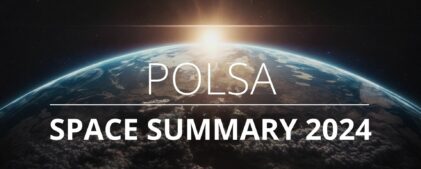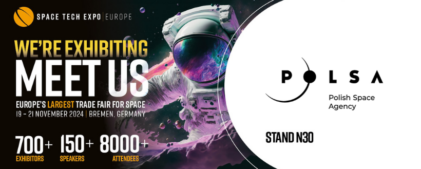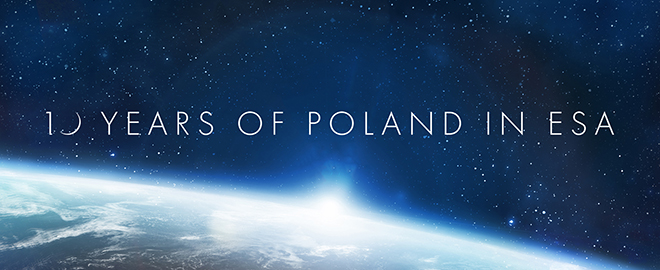Among the benefits stemming from 10 years of Poland in the European Space Agency, we can enlist contracts worth €140M, 300 cooperating entities including over 150 directly involved in projects, access to ground and space-based infrastructure, collaborations with national agencies and the most prominent companies of the space sector, opportunities for developing Polish technologies, significant involvement in the space projects’ supply chain, personnel training and various educational programmes, and many, many more.
Over the years, the world-renown accomplishments of Polish scientists and space engineers have served as the ground for seeking out various solutions, which would eventually lead to the development of the Polish space sector.
The very first connections between Poland and the European Space Agency date back to 1994 when Poland signed the Cooperation Agreement in the field of the peaceful use of outer space, which was expanded later in 2002. The collaboration between Poland and ESA became closer after Poland joined the European Union in May 2004. Since then, the Polish government started negotiations which eventually led to the signing of the European Cooperating State Agreement in 2007. An immediate result of this Agreement was a significant improvement in the number, quality, and level of advancement in Polish products and services utilising satellite technology.
Poland in ESA
The most important step towards the development of the Polish space sector was joining the European Space Agency in 2012. Let’s bring up some of the most important events of that time:
- ESA Council unanimously agrees to Poland joining ESA in July 2012
- Exchange of accession agreements in Warsaw, September 13th, 2012. Poland was represented by Waldemar Pawlak, Minister of Economy, while ESA was represented by its General Director Jean-Jacques Dordain
- Ratification of the Agreement by the Polish parliament and the President of Poland in November 2012
- Poland becomes the 20th Member State of the European Space Agency on November 19th, 2012
The cooperation with ESA gave the Polish space sector an enormous boost. Presently, Polish entrepreneurs and scientists cooperate with new partners, develop various technologies, and receive both funding and opportunities provided by access to ESA’s infrastructure. The Polish sector learns from the experience and knowledge of other member states, shares its achievements and experiences, and participates in ground-breaking projects – all of this resulting in Poland becoming a significant and recognisable partner in European space programmes.
Polish activities in the European Space Agency are coordinated by a delegation comprised of the representatives of Polish Ministries – the Ministry of Economic Development and Technology, Ministry of Science and Education, Ministry of Foreign Affairs, Chancellery of the Prime Minister of Poland, as well as two agencies: the Internal Security Agency and Polish Space Agency. Additionally, the delegation is supported by experts from Polish Armed Forces, science, and public administration sectors.
ESA’s activities fall into two categories: mandatory programmes, in which every member state is obliged to participate, and the amount of contribution is calculated based on the country’s GDP, and optional programmes, funded by participating parties in amounts declared during a cyclical ESA’s Councils at ministerial level.
In 2019, the Polish Industry Incentive Scheme (PLIIS) 2012-2019 – a support scheme for Polish entities – has ended. For the time of its duration, 45% of the Polish contribution to ESA’s budget was channeled to adjusting Polish industry, academia, and other economic entities to the requirements of the European Space Agency. Around five hundred applications have been submitted to PLIIS, from which over two hundred were accepted.
Presently, Polish contribution amounts to around €40M annually. These necessary expenditures allow us to participate in various programmes, such as Earth observation, satellite communication, telecommunication and application, space exploration, Space Situational Awareness, or programmes concerned with building scientific instruments.
For Polish companies and research institutes, joining ESA has opened a path of intense development of space technologies and satellite techniques thanks to full participation in ESA’s programmes. Over the past few years, Polish scientists have contributed to many European space missions, including CASSINI-HUYGENS, ROSSETTA, BEPICOLOMBO, or SOLAR ORBITER.
The year 2012 proves itself pivotal for Poland’s aim to make active use of outer space. It was that year when the first Polish student’s nanosatellite PW-Sat, build with the collaborative efforts of the Warsaw University of Technology and Space Research Centre of the Polish Academy of Science, was put in the geocentric orbit. The following year, the first Polish scientific nanosatellite LEM was launched, and later on, together with its twin satellite HEWELIUSZ (launched in 2014), has joined BRITE – the international constellation of satellites. Up-to-date, several other Polish constructions have been put in orbit, mainly based on the CubeSat platform. Currently, Polish research focuses on building larger satellites and their constellations for use in the field of Earth observation, including utilisation by the Polish Armed Forces and for scientific purposes, such as astrophysical research.
Establishing the Polish Space Agency
In two years following Polish joining in ESA, the Sejm of the Republic of Poland passed a law establishing the Polish Space Agency (POLSA) – an executive body of the Polish government, subordinate to the Ministry of Economic Development and Technology (MRiT). POLSA not only integrates sectors of public administration, science, and business but also plays a significant role as a partner in talks with international entities. The agency’s activities focus on the maximisation of satellite system usage and advancing the development of space technologies for the use of the Polish public administration system, science sector, education, economy, and defence. According to the Polish Space Strategy (PSK), adopted by the Sejm in 2017, POLSA helps MRiT in defining the National Space Programme (KPK). This document, based on the previously allocated financial resources, aims at defining systematic goals, plans, and challenges for the Polish space sector in the upcoming years.
POLSA’s active cooperation with ESA is especially prominent in the Space Situational Awareness (SSA) programme. As a part of the programme, POLSA is monitoring the Earth-adjacent Universe for the purpose of detecting space debris and other objects approaching Earth from within the Solar System thanks to a network of automatic telescopes located around the globe. The agency also engages in activities aiming at increasing the use of satellite data in national and local government administration, as well as promoting wide-use satellite data. POLSA’s flag project pioneering in this field was Sat4Envi – a platform for sharing and processing satellite data provided by Copernicus Programme and satellites of the Sentinel series, as well as other environmental and meteorological satellites’ data stored at the Institute of Meteorology and Water Management (IMGW-PIB). Due to the remarkable success of the Sat4Envi project, POLSA is providing subsequent training series, especially in the field of public administration. Another international project in which POLSA participates is the ENTRUSTED project. The goal of ENTRUSTED is to identify the needs and expectations of the end-users of the safe satellite communication system. This project will lay the groundwork for the future EU programme GOVSATCOM, which will ensure safe access to satellite communication for public administration of the EU Member States, institutions and agencies.
Polish space sector
Presently, the employment in the Polish space sector is estimated at around 12 thousand jobs for a few hundred economic entities (over 300, as for 2020). Polish companies are exceptionally active in the following fields: robotics, mechatronics, on-board units power supply system, optical and communication systems for satellites, sensors and drills for space probes, or software for testing objects before launching. For a few years now, we have been working on fully retrievable Polish suborbital rockets, able to reach over 100 km ceiling – i.e., the Kármán line, a so-called border of the outer space. The aim is to design these rockets in a way they will be able to carry several dozen kilograms of load, for example, various scientific-engineering experiments requiring a micro-g environment.
Plans for 2022 with ESA
In 2022, we celebrate the 10th anniversary of Poland in the European Space Agency. It makes the scheduled for November ESA’s Council at ministerial level especially important, as the council will announce crucial decisions regarding the funding of the European space sector. The decisions will cover both the launching of new space programmes and the continuation of the currently carried out ones, as well as the overall financial liability for the upcoming years. During negotiations, the Polish delegation will pay particular attention to the implementation of the National Space Programme in 2022, which will determine the path of development for the Polish space sector for the following years. The role of Poland in the European space sector will certainly be also affected by the space activities act, which final version will be prepared in the next few months as a result of joint operations of academia and public administration.
As a part of celebrating the anniversary of joining ESA, POLSA will focus on providing insight into ESA’s activities and its role in the development of the space sector. More details will be available soon at www.polsa.gov.pl







 Back
Back




